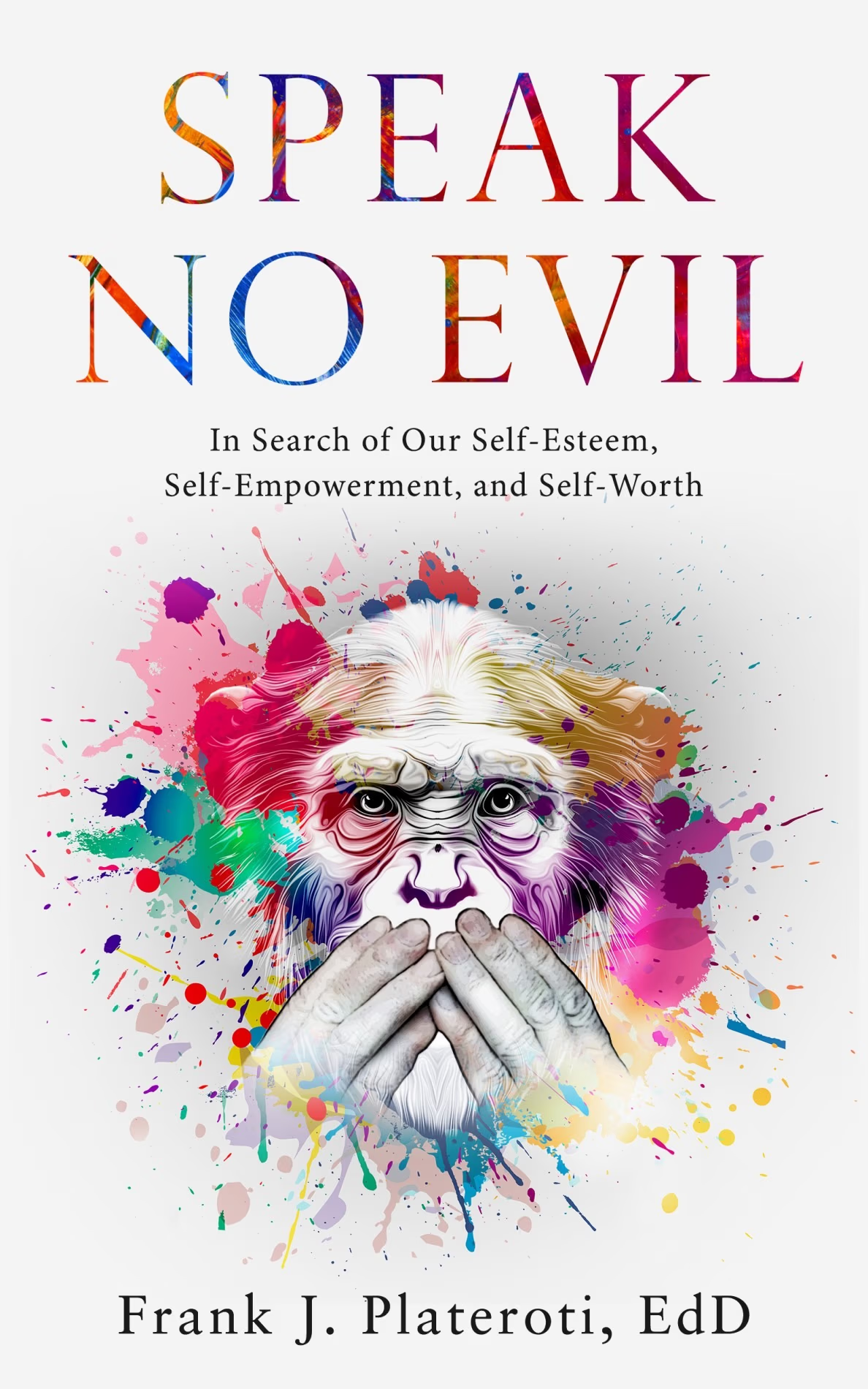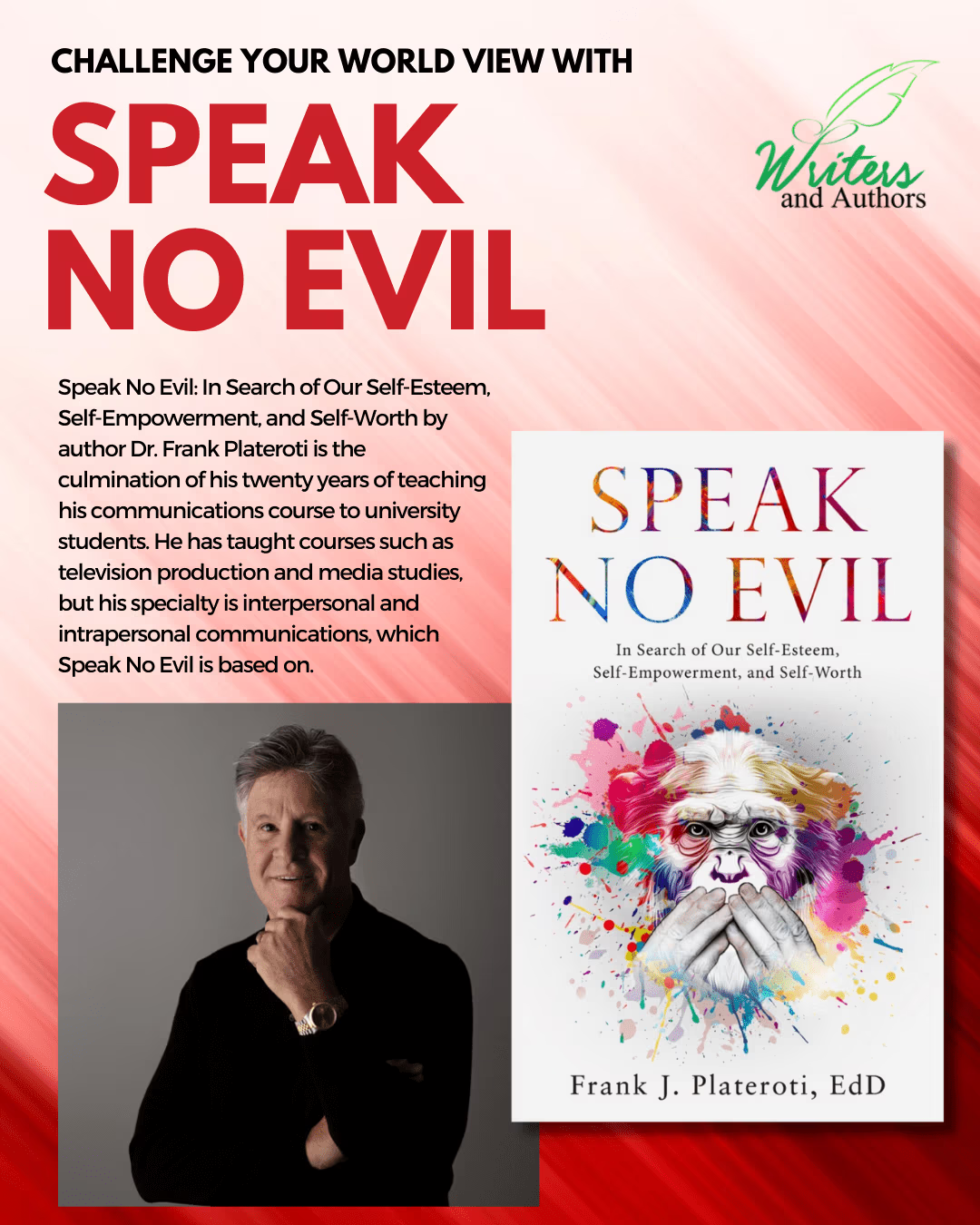Speak No Evil: In Search of Our Self-Esteem, Self-Empowerment, and Self-Worth by author Dr. Frank Plateroti is the culmination of his twenty years of teaching his communications course to university students. He has taught courses such as television production and media studies, but his specialty is interpersonal and intrapersonal communications, which Speak No Evil is based on. This book is offering a way to challenge the way you view and approach yourself and others. We asked Dr. Plateroti some questions to dig a little deeper into his thought processes!
What is the PRIMARY benefit, above all others, that your potential reader will gain from reading this book?
My latest book is Speak No Evil: In Search of Our Self-Esteem, Self-Empowerment, and Self-Worth. The book is based on the intra/intercommunication course I developed, which includes many communication strategies and concepts that I developed, as well as some concepts that are based on well-known communication research. I would have to say my inspiration for writing the book was  primarily on the feedback I received my students. A few of the events that served as my inspiration are highlighted in the book. The mantra of my course was, “Communication is Life and Life is Communication.” Although a simple term, when we see on a day-to-day basis how many people are communicating on their cell phones, is there any doubt in the necessity for the need to communicate? How many of us have panic when we either misplace or forget our cell phones?
primarily on the feedback I received my students. A few of the events that served as my inspiration are highlighted in the book. The mantra of my course was, “Communication is Life and Life is Communication.” Although a simple term, when we see on a day-to-day basis how many people are communicating on their cell phones, is there any doubt in the necessity for the need to communicate? How many of us have panic when we either misplace or forget our cell phones?
I believe readers will benefit from a better understanding of the concept of the importance of self-esteem, which has created some confusion over the years with many people having the perception that self-esteem simply means having a lot of confidence, and for some it could even get to the point of arrogance. Simply put, self-esteem is our overall opinion of ourselves, our abilities, talents, and limits. This opinion of ourselves can be both positive and negative and there are many variables that determine our self-esteem. I find it better to use the term “healthy self-esteem” to describe a positive, honest, and humble opinion of who we are within the ongoing development of our identity. From healthy self-esteem we can grow our self-empowerment and then we alone can allow ourselves to determine our self-worth and build a positive self-identity.
Healthy intra-personal communication (self-talk) and inter-personal communication (with others) plays a huge part in growing our self-esteem. Although it appears very simple in writing, searching for our self-esteem, self-empowerment, and self-worth can be an insurmountable task. My goal is to share with the reader the concepts and experiences I used in my life and in my teachings to inspire them to find their self-esteem, self-empowerment, and self-worth.
If you had to compare this book to any other book out there, which book would it be?
There are many books written on self-esteem. What I consider the best research source, and have used his work in my course, is from the Nathaniel Branden who has written several books on self-esteem. I took some of his research and just skewed it a bit, which I refer to in my book. For example, Branden refers to the levels of self-esteem as high and low self-esteem.
I instead use the terms healthy and unhealthy self-esteem. Since high self-esteem can sometimes be too high, it could then be considered a form arrogance. They may then think themselves above everyone else with unintended consequences. For example, “I want what I want because I deserve it and if I have to steal to get what I want, so be it.” And then they find themselves arrested and in jail. I consider that a person with unhealthy self-esteem. I consider someone with healthy self-esteem as someone who is positive, honest with themselves, has a humble opinion of who they are, and has an ongoing positive development of their self-identity.
Hundreds of thousands of books come out every year. Why should someone buy THIS book?
The pandemic drastically changed the way we communicate, maintain relationships, and earn a living. During the pandemic communicating with people relied less on face-to face communication and more on technology. Relationship challenges that were difficult before the pandemic were made even more challenging during quarantine.
Even prior to the pandemic, many people give up privacy with demand for an immediate response from social media “friends.” Things that we wouldn’t say or do in person or over the phone, we have no problem texting or tweeting; with sometimes destructive consequences.
As individuals, how do we turn the tide? How do we cope with living during this fast-paced technological age? The most important aspect of our lives is relationships. How do we maintain our mental health and relationships? Is it too late to change who we are? Can we become conscience of our motivation of what we say, realizing how it effects other people and ultimately ourselves? Speak No Evil addresses the importance of relationships and offers ways to cultivate and maintain them. But, we must first realize that the most important relationship first is with ourselves. When we can grow healthy self-esteem we can then further develop our self-empowerment and healthy self-worth and have rewarding relationships.
Who is your target audience?
I believe the target audience can start as early as 12-14 years old and up. For example, an important chapter is on social media that involves everyone who is old enough to use a cell phone. The later elementary school years through twelfth grade can be brutal. When young people are being influenced by so-called “influencers”, they may find that they are empowering others to determine their self-esteem, self-empowerment, and self-worth. It can be very dangerous.
What I want to say is that I am not condemning social media, and reality programming, etc. I just believe everyone should realize that it is for entertainment purposes. There are those who become obsessed with certain things and social media is one of them. Obsession of anything is unsatisfying and unhealthy. I believe we should analyze how we use and abuse social media, and the influence it has on us and other people. The impact that social media has on society is staggering.
Think about it. Social media is any digital tool that allows users to quickly create and share content like pictures, videos, and written content with family, friends, and just about everyone in the world in real time. It covers a wide range of websites and apps like Facebook, Twitter, Instagram, and blogging. What makes social media unlike other mass media is that it takes a lot of territory and to a large degree is uncensored. Which is a major component and potential problem. Although many social media companies impose some limitations like taking down images that show violence or nudity (although comments, images and sending them through cell phones has no limitations), there are much fewer limitations on what someone can send, unlike the older forms of mass communication like newspapers, radio stations, and network television.
Social media is a double-edged sword. On one hand, it allows us to communicate and connect in real time with family, friends, and those who become “followers.” Communication with the proper motivations is a great thing. But what happens when social media is used to bully and share lies? As early as when someone is old enough to use a cell phone, we should discuss these things. I would implore parents and educators to consider this.
Did your environment or upbringing play a major role in your writing and did you use it to your advantage?
Yes. Absolutely. For me, growing up in the suburbs in the 1950s and living in a new and very similar styled home within our manufactured neighborhood, I felt like we lived like everyone else: with no more or no less. I lived by the codes of social behavior that my parents taught me, directly or through their example, day in and day out as my brothers and I were growing up, which of course had a huge effect on our lives. My parents agreed about the importance of discipline, priorities, and values, but expressed it in different ways. My mother would often (very often) remind us:
“Mind your own business and worry about what you have to worry about.”
“Don’t get involved in things that don’t concern you.”
“When you get your own house, you do what you want. As long as you live under our roof, you abide by our rules.”
“You better learn respect.”
“You kids have big ears. What you hear doesn’t leave this house!”
“You better learn when to keep your mouth shut and learn respect!”
“If you don’t have anything nice to say about someone, just shut up!”
“You better wise up.”
“I am going to teach you how to appreciate what you have whether you like it or not!”
“You’re going to college.”
These statements may seem rough and intense by today’s politically correct ways of familial communication, but the essence of their meaning is as true today as it was back then. It was also made clear, in no uncertain terms, that any discussion of race, bigotry, or any type of gossip or disrespect was never was allowed in our home. If displayed, it would earn a smack in the mouth with the back of my mother or father’s hand. Both my parents enforced this upbringing, especially my mother. And although my father wasn’t as vocal, he supported my mother a hundred and ten percent. Both parents operated completely in concert, and when it came to respecting and helping others, they both led by example.
Tell us your most rewarding experience since publishing your work?
An interesting question. The concept of a “rewarding experience” comes in phases. When I first begin to  develop a story or write a book, particularly one that is made up of concepts and experiences such as Speak No Evil, the idea of a rewarding experience is far in the distance. Regardless of the genre, writing is a solitary experience. Although a writer may feel they have something to offer, there may also be bouts of self-doubt during the process. Any idea of a reward is that they are able to just to keep writing. There are a few trusted, unbiased sources that review my work, and there is a small form of a rewarding experience during the process because those who I have trusted consider my work good and I am on the right track. The next phase of experiencing any reward takes time and patience. It becomes an important motivating force to just continue to write. Also, for me the motivating force and the concept of “reward” is not monetary. The real reward is the completion of the book, its publication. If the book is accepted and read, that’s the big reward. The monetary gain is the “icing on the cake”, and don’t get me wrong. It’s a nice reward!
develop a story or write a book, particularly one that is made up of concepts and experiences such as Speak No Evil, the idea of a rewarding experience is far in the distance. Regardless of the genre, writing is a solitary experience. Although a writer may feel they have something to offer, there may also be bouts of self-doubt during the process. Any idea of a reward is that they are able to just to keep writing. There are a few trusted, unbiased sources that review my work, and there is a small form of a rewarding experience during the process because those who I have trusted consider my work good and I am on the right track. The next phase of experiencing any reward takes time and patience. It becomes an important motivating force to just continue to write. Also, for me the motivating force and the concept of “reward” is not monetary. The real reward is the completion of the book, its publication. If the book is accepted and read, that’s the big reward. The monetary gain is the “icing on the cake”, and don’t get me wrong. It’s a nice reward!
How would you describe your writing style?
It depends if it’s fiction or nonfiction. Speak No Evil is a nonfiction and more within the academic genre. Although it is made up of communication concepts and strategies I developed, I put a great deal of my personal life experiences and beliefs into the book. So there’s more of what I call an informal, conversational tone or style.
If the book is fictional like, East Clifton Avenue, the style is more formal and structured with plot mechanisms, character development and dialogue. The story has to be more planned with flashbacks and that help develop the character and plot. Characters and dialogue have to drive the story and it takes a great deal more work, planning, review and re-writing.
Are your characters pure fiction, or did you draw from people you know?
In East Clifton Avenue the characters are nonfictional for the most part and some have the combined real-life characteristics of more than one person. This is due to the fact that they are real life people that I have placed in a fictional work. I draw from real people. In some cases, for personal reasons, I am the only one who knows who they really are. But some who are close to me and related may be able to guess.
Are you more of a character artist or a plot-driven writer?
East Clifton Avenue is primarily character-driven. Because the stories of the characters are disjointed, I had to construct a framework that makes sense as a story. I tried to make the plot as true as I can so the characters can come to life and have a connection.
Here is small example from the opening of Chapter one, which will offer a sense of the framework:
“I am introducing to you to the Buonofortes: A family similar to my mother’s family and the millions of other families who immigrated to this great country at the beginning of the last century. The Italian immigrants took the place among the other immigrants who came before them and who were already acclimated and settled in their new country. Similar to all the new immigrants, regardless of nationality, they all share the same passion; to make a better life for themselves, their children, and generations to come. The Buonoforte family live in Clifton, New Jersey: A town similar to thousands of small towns on the north-eastern part of the United States.”
What do you hope to accomplish with your book other than selling it?
Based on my experience of over twenty years of teaching and inspiring thousands of students, the positive feedback that I have received, not only from my students but also from the people the reviewed my work before publication, has been overwhelming. I believe Speak No Evil can help many people, even in the smallest way. That’s my ultimate goal.
How can our readers get in touch with you?
The best way is to go to my website: drfjpesteem.com
Where can our readers purchase your book?
The best place to buy it is Amazon, where there are also reviews.
Also, Barnes and Noble and other online sources.





















